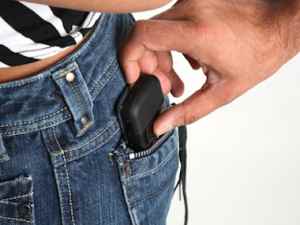

MedFriendly®


Kleptophobia
Kleptophobia is an abnormal and intense fear of being
stolen from and/or becoming a thief. Kelptophobia is
often (but not always) caused by a previous traumatic
experience of being stolen from (e.g., being robbed at
gunpoint).
Alternatively, someone who has stolen from others
(particularly if they were arrested for this) may fear
that he/she will steal again in the future (and face
possible legal consequences).
FEATURED BOOK: The Anxiety and Phobia Workbook
WHAT ARE SIGNS AND SYMPTOMS OF KLEPTOPHOBIA?
While most people have normal apprehensions about being stolen from and not stealing
from others, these feelings can develop into kleptophobia when it significantly limits the
personís daily functioning and/or causes harm. Someone who has kleptophobia who is
afraid of being stolen from may become easily upset if they feel they have been
overcharged for something in a business dealing. This can lead to increased fear that
more significant overcharges may occur in the future. As a result, such people can
appear defensive, aggressive, or even paranoid. Someone with kleptophobia is likely to
hide or lockup valuables when visitors come over, be hypervigalent when around others
(especially strangers), avoid walking places alone (especially at night), avoiding large
crowds (where one is more likely to be pick pocketed), repeatedly check over bills and
contracts, avoid making donations, and avoid borrowing money or other valuables (even
to close friends and family).
"Where Medical Information is Easy to Understand"™
Someone with kleptophobia who is afraid of stealing may also worry
that they are being a thief for later accepting too much change in a
business transaction or an extra grocery item placed in a bag once
arriving home, even if this occurred unknowingly. Someone with this
form of kleptophobia may become extremely honest and giving (to
avoid any notion that he/she may be taking more than is proper).
Such people may avoid taking the last serving of food (fearing that it
is stealing), repeatedly check received change, avoid situations
where temptations to steal are more likely (e.g., when near money,
loose belongings of others, or when many people are present), will
follow rules strictly (to avoid cheating since this is a form of
stealing), and refuse to borrow or loan things.
Eventually, people with kleptophobia can become more anxious, socially isolated, depressed (along with
shames, worthlessness, and/or low self esteem), more anxious, and develop low self-esteem.
A psychological technique that is very helpful in treating kleptophobia is cognitive behavioral therapy
(CBT) in which people learn to change their thoughts to change their resulting feelings. The person learns
not to over-estimate the risk of being stolen from or stealing from others. In this way, thoughts become
less intrusive and anxiety-provoking. CBT is the most common form of treatment. Another technique is a
method known as desensitization in which a person is taught how to relax when being exposed to
situations (e.g., crowds, near money) where they believe they are more likely to be stolen from or to steal.
The person is exposed to more intense forms of the stimulus (e.g., more people in the crowd, greater
amounts of money) as they master the fear at the less intense level. Sometimes, the more intense form of
the stimuli is based on the amount of the stimuli whereas in other cases it may be based on the duration
of exposure (e.g., one minute, two minutes, three minutes, etc, such as the length of time that elapses in a
crowd or near money). CBT is often combined with desensitization and typically works within a few
months.
Another treatment technique is a behavioral method known as flooding in which the person is immersed
directly in the feared stimulus (e.g., large sums of money, large crowds) to demonstrate that the fear is
irrational. The fear is replaced by realization of this and the application of relaxation techniques. Flooding
is a faster but more traumatic form of treatment than desensitization. A more insight-oriented technique
involves exploring the original cause of the phobia (e.g., a traumatic event) and trying to resolve issues
surrounding this. This may involve use of CBT techniques and/or other counseling methods. Kleptophobia
can be treated by an anti-anxiety medication designed to decrease anxiety. Sometimes, antidepressant
medications may be used because some anti-depressants are useful for treating anxiety as well as
depression.
WHAT IS THE ORIGIN OF THE TERM, KLEPTOPHOBIA?
Kleptophobia comes from the Greek word "klepto" meaning "to steal," and the Greek word "phobos"
meaning "fear. Put the two words together and you have "fear (of) to steal."















